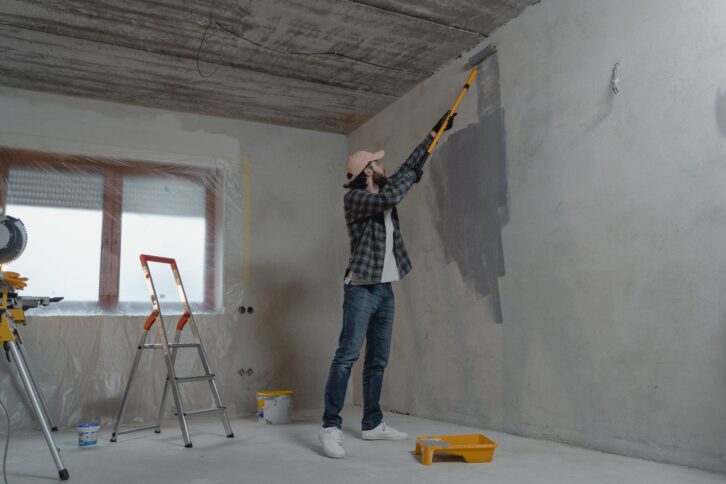As remote work becomes increasingly more accessible to U.S. workers, now may be the perfect time to convert your concrete basement space into a comfy office or alternative living space. Need ideas on how to pay for finishing a basement?
A finished basement gives your family more room to spread out while adding to the value of your home. But, this renovation can be pricier than you may expect. The good news is that this renovation is well worth the investment and promises a high return. Plus, there are ways to cover the costs of home improvement financing without having to pay out of pocket.
When securing a loan to finish basement renovations, you have options. In this guide, we’ll break down the initial costs as well as how you can use a home equity loan to finish basement renovations.
How Much Does it Cost to Finish a Basement?
Finishing a basement seems like a fun DIY project for the whole family. But, to transform it from a concrete cave where you keep boxes and old junk to a habitable and warm space to live in requires the help of licensed professionals.
This means that the total cost for basement renovations can be anywhere from a couple thousand dollars to over $80,000, with $18,400 being the average.
So, what does that cover? To give you an idea, these costs include:
- Drywall — Expect to pay roughly $15 per panel to add drywall.
- Flooring installations — The average cost is around $3,000, but this number varies depending on the material and amount used.
- Framing — When it comes to building your unfinished basement’s frame, the cost can range from hundreds of dollars to nearly $2,000. But, that doesn’t include insulation and drywall.
- Labor — This involves the costs to pay a general contractor and a licensed electrician/plumber. You may also need a foundation repair specialist, a framer, a drywall installer, and other home renovation professionals.
- Permits — Any electrical or plumbing work needs to have a permit and pass a safety inspection test. This cost averages close to $1,000 to $2,000.
- Waterproofing — This protects the room from costly mold and mildew renovations down the line. The price for basement waterproofing varies from a few hundred dollars to almost $5,000.
Plus, if you decide to put in a bathroom or a bar, that’s an added expense. But, 40% of your budget will likely be going toward labor costs.
How to Develop a Budget
As you can see, the cost of basement renovations can add up quickly. As such, creating a budget ensures financial stability during a large home improvement project. Unsure of how to create a financial plan? We got you covered. Here are a few suggestions for how to get started on basement financing:
- Determine your long-term and short-term basement remodeling goals (e.g. what the space is for and if you want to have a bathroom/bar)
- Research the jobs you want to do for your basement space and their estimated prices
- Decide what jobs require a licensed professional and what jobs you can DIY safely
How to Pay for Finishing a Basement
So you’ve done your research and created a rough outline for your budget. Now it’s time to figure out how to pay for finishing a basement project.
Luckily, you don’t have to shoulder the costs yourself. There are several types of home improvement loans as well as ways to secure basement renovation financing, including:
- Personal Loan – This fixed-rate loan for your basement finishing project comes in two versions: secured or unsecured. A secured loan requires collateral, but an unsecured loan has higher rates.
- Contractor Financing – If you decide to hire a contractor, they may offer you basement remodel financing. The terms and rates vary depending on the lender they work with, but you’ll get the exact funding you need for your basement finishing project.
- Home Equity Loan/Home Equity Line of Credit – A home equity loan or a HELOC are two loan options that convert the equity in your home for cash. But, this type of loan does use your home as collateral.
- Sale-leasebacks — If using your home as collateral makes you nervous, then a sale-leaseback is a home equity loan alternative to help you have a finished basement. It allows you to use your home’s equity without the risk of losing your home by selling it and converting your equity to cash.
Sale-Leasebacks: An Alternative Home Equity Solution
Your home equity is your most valuable asset. And through a sale-leaseback solution, you can use that equity to finish your basement space and increase its value without the risks associated with a typical home equity loan.
A sale-leaseback program can provide you with an effective funding solution so you can get your home improvement projects off the ground quickly and securely. Contact an expert to learn more.
Key Takeaways
If you’re looking for ways to pay for finishing or redesign a basement, you have options for home improvement financing. If you are still unsure of ways to pay for your finished basement after reading this article, consult a financial advisor to discuss your options.
Sources:
- Forbes. How Much Does It Cost To Finish A Basement? https://www.forbes.com/advisor/home-improvement/cost-to-finish-a-basement
- Geico. 8 Tips To Finish Or Remodel A Basement On A Budget. https://www.geico.com/living/home/home-improvement/finished-basement/



















